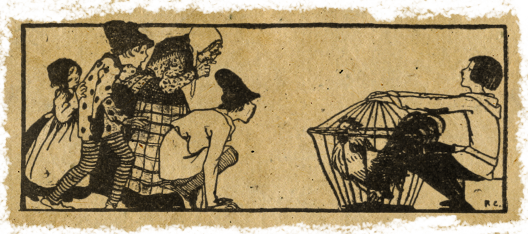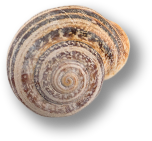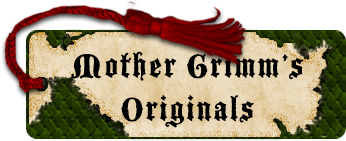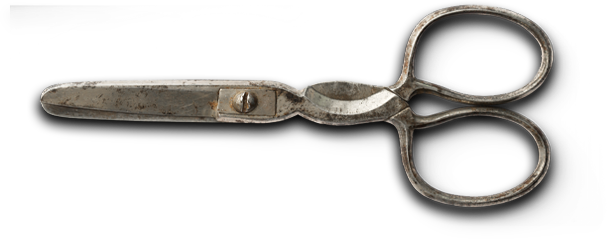
A father once called his three sons before him. He gave to the first a cock, to the second a scythe, and to the third a cat.
“I am old,” said he, “my death is nigh, and I have wished to take thought for you before my end. Money I have not, and what I now give you seems of little worth. But all depends on your making a sensible use of it. Only seek out a country where such things are still unknown, and your fortune is made.”
After the father’s death, the eldest went away with his cock. But wherever he came the cock was already known. In the towns, he saw him from a long distance, sitting upon the steeples and turning round with the wind; and in the villages he heard more than one crowing. No one would show any wonder at the creature, so that it did not look as if he would make his fortune by it.
At last, however, it happened that he came to an island where the people knew nothing about cocks, and did not even understand how to tell time. They certainly knew when it was morning or evening. But at night, if they did not sleep through it, not one of them knew how to find out the time.
“Look!” said he, “what a proud creature! It has a ruby-red crown upon its head, and wears spurs like a knight. It calls you three times during the night, at fixed hours; and when it calls for the last time, the sun soon after rises. But if it crows by broad daylight, then take notice, for there will certainly be a change of weather.”
The people were well pleased. For a whole night they did not sleep, and listened with great delight as the cock at two, four, and six o’clock, loudly and clearly proclaimed the time. They asked if the creature were for sale, and how much he wanted for it.
“About as much gold as an ass can carry,” answered he.
“A ridiculously small price for such a precious creature!” they cried all together, and willingly gave him what he had asked.
When he came home with his wealth, his brothers were astonished, and the second said, “Well, I will go forth and see whether I cannot get rid of my scythe as profitably.” But it did not look as if he would, for laborers met him everywhere, and they had scythes upon their shoulders as well as he.
At last, however, he chanced upon an island where the people knew nothing of scythes. When the corn was ripe, they took cannon out to the fields and shot it down. Now this was rather an uncertain affair. Many shot right over it, others hit the ears instead of the stems and shot them away, whereby much was lost; and besides all this it made a terrible noise.
So the man set to work and mowed it down so quietly and quickly that the people opened their mouths with astonishment. They agreed to give him what he wanted for the scythe, and he received a horse laden with as much gold as it could carry.
And now the third brother wanted to take his cat to the right man. He fared just like the others. So long as he stayed on the mainland, there was nothing to be done. Every place had cats, and there were so many of them that most new-born kittens were drowned in the ponds.
At last, he sailed to an island, and it luckily happened that no cats had ever yet been seen there, and that the mice had got the upper hand so much, that they danced upon the tables and benches whether the master were at home or not. The people complained bitterly of the plague. The King himself, in his palace, did not know how to secure himself against them. Mice squeaked in every corner, and gnawed whatever they could lay hold of with their teeth.
But now the cat began her chase, and soon cleared a couple of rooms, and the people begged the King to buy the wonderful beast for the country. The King willingly gave what was asked, which was a mule laden with gold; and the third brother came home with the greatest treasure of all.
The cat made merry with the mice in the royal palace, and killed so many that they could not be counted. At last she grew warm with the work and thirsty, so she stood still, lifted up her head and cried, “Mew! mew!”
When they heard this strange cry, the King and all his people were frightened, and in their terror ran out of the palace.
Then the King took counsel what was best to be done. At last, it was decided to send a herald to the cat, and command her to leave the palace; if not, she was to expect that force would be used against her.
The councilors said, “We would rather be plagued with mice to which misfortune we are accustomed, than give up our lives to such a monster as this.”
A noble youth, therefore, was sent to ask the cat whether she “would peaceably quit the palace.” But the cat, whose thirst had become still greater, answered again, “Mew! Mew!”
The youth thought that she said, “Most certainly not! Most certainly not!” and took this answer to the King.
“Then,” said the councilors, “she must yield to force.”
Cannon were brought out, and the palace was soon in flames. When the fire reached the room where the cat was sitting, she sprang safely out of the window. But the besiegers did not leave off, until the whole palace was shot down to the ground.






